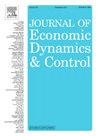Reprint of: How do households respond to income shocks?
IF 2.3
3区 经济学
Q2 ECONOMICS
引用次数: 0
Abstract
We use panel data from the Italian Survey of Household Income and Wealth from 1991 to 2016 to document what components of the household budget constraint change in response to shocks to household labor income, both over shorter and over longer horizons. Consumption and wealth responses are informative about the household consumption (or savings) function and thus about what class of consumption-savings model best describes the data. Empirically, we first show that shocks to labor income are associated with negligible changes in transfers and non-labor income components, modest changes in consumption expenditures, and large changes in wealth. To understand the wealth response we then split households into a sample that does not own business or real estate wealth, and a sample that does. For the first group, we find that consumption responses are more substantial (and increasing with the horizon of the income shock) and wealth responses are much smaller (and mildly increasing with the income shock horizon). Turning to theory, we argue that for this group, a simple extension of the standard permanent income hypothesis (PIH) consumption function that allows for partial insurance against even permanent income shocks explains the consumption and wealth responses well, both at short and long horizons. For the second group with business wealth or real estate wealth the standard framework cannot explain the large changes in wealth associated with income shocks. We conclude that models which include shocks to the value of household wealth are necessary to fully evaluate the sources and consequences of household resource risk.
转载自:家庭如何应对收入冲击?
我们使用了1991年至2016年意大利家庭收入和财富调查的面板数据,记录了家庭预算约束的哪些组成部分在短期和长期内对家庭劳动收入的冲击做出了反应。消费和财富的反应是关于家庭消费(或储蓄)函数的信息,因此关于哪一类消费-储蓄模型最能描述数据。从经验上看,我们首先表明,对劳动收入的冲击与转移和非劳动收入组成部分的可忽略不计的变化、消费支出的适度变化和财富的巨大变化有关。为了理解财富反应,我们将家庭分成两组,一组不拥有商业或房地产财富,另一组拥有商业或房地产财富。对于第一组,我们发现消费反应更大(并且随着收入冲击的范围而增加),而财富反应要小得多(并且随着收入冲击的范围而温和增加)。转向理论,我们认为,对于这一群体,标准永久收入假设(PIH)消费函数的简单扩展,允许对永久收入冲击进行部分保险,可以很好地解释短期和长期的消费和财富反应。对于拥有商业财富或房地产财富的第二组,标准框架无法解释与收入冲击相关的财富的巨大变化。我们的结论是,为了充分评估家庭资源风险的来源和后果,有必要建立包括家庭财富价值冲击的模型。
本文章由计算机程序翻译,如有差异,请以英文原文为准。
求助全文
约1分钟内获得全文
求助全文
来源期刊

Journal of Economic Dynamics & Control
ECONOMICS-
CiteScore
3.10
自引率
10.50%
发文量
199
期刊介绍:
The journal provides an outlet for publication of research concerning all theoretical and empirical aspects of economic dynamics and control as well as the development and use of computational methods in economics and finance. Contributions regarding computational methods may include, but are not restricted to, artificial intelligence, databases, decision support systems, genetic algorithms, modelling languages, neural networks, numerical algorithms for optimization, control and equilibria, parallel computing and qualitative reasoning.
 求助内容:
求助内容: 应助结果提醒方式:
应助结果提醒方式:


